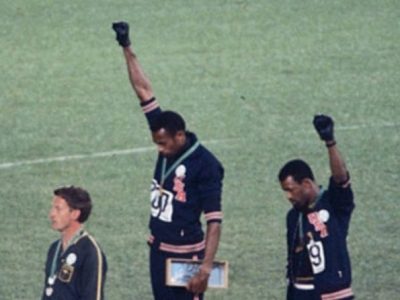On 16 October 1968, American sprinters Tommie Smith and John Carlos took a stand that would see them banished from the Olympic games.
In 1968, the United States already had a lot on its plate. This was a country enmeshed in civil rights and anti-war protests. Civil rights activist Martin Luther King Jr had been assassinated on 4 April, and Attorney General Robert F Kennedy had been assassinated on 6 June. Coupled with that, people were conflicted over the Vietnam War.
Olympic Project for Human Rights boycott
Tommie Smith and John Carlos were both track and field stars at San Jose State in the 1960s. In 1967, a professor in the Department of Sociology, Harry Edwards, founded the Olympic Project for Human Rights (OPHR). Smith and Carlos were amongst the first to join the group.
OPHR was the spark that lit the fire for global recognition of equality. The group’s original aim was to protest racial segregation in the United States, but this evolved into a larger, global movement leading up to the Olympics.
Their aim was to draw international attention to racial discrimination in the United States. Before the Olympics, many African American athletes had talked of joining a boycott of the Games to protest racial injustices in the United States.

But many Black athletes were uncertain about the OPHR boycott because they wanted to compete in the leading world event, but they also felt a responsibility to improve the bad conditions that black athletes often faced in comparison to their white counterparts.
During this time, the International Olympic Committee (IOC) readmitted South Africa to the Olympics. In response, nearly every African nation and many other developing nations withdrew their teams. As pressure continued to mount, the IOC reversed their decision, re-expelling South Africa.
At the US Olympic Trials, the OPHR’s boycott was cancelled due to insufficient support. Tommie Smith and John Carlos, both integral members of the OPHR, had qualified to go to Mexico City as part of the US Olympic Team.
Black Power salute
Smith and Carlos attended the games, and Smith finished first in the 200-meter dash, setting a new world record, while Carlos finished third. Despite the failure of the boycott, they attended the medal ceremony dressed to protest, wearing black socks and no shoes to symbolise African-American poverty and a black glove to express African-American strength and unity. Smith also wore a scarf, and Carlos beads, in memory of lynching victims.

As the national anthem played and an international TV audience watched, each man bowed his head and raised a fist.
When they left the podium at the end of the ceremony, they were booed by many people in the crowd.
It has to be noted that the Australian Peter Norman, who won the silver medal in the 200m event, wore an OPHR badge in support of Smith and Carlos’ protest.
Within a few hours, the actions of the two athletes were being condemned by the International Olympic Committee. A spokesperson for the organisation said it was “a deliberate and violent breach of the fundamental principles of the Olympic spirit.”
At a press conference after the event, Tommie Smith, who held seven world records, said:
“If I win, I am an American, not a black American. But if I did something bad then they would say ‘a Negro’. We are black and we are proud of being black. “Black America will understand what we did tonight.”
Two days later, the two athletes were suspended from their national team, expelled from the Olympic Village and sent home to America.
On their return home, many Americans were upset with them, perceiving them as troublemakers, and both men received death threats. The African American community, on the other hand, welcomed them as heroes.
Both men continued in athletics. Smith later played football with the Cincinnati Bengals before becoming an assistant professor at Oberlin and a US National Team coach. Carlos played football for the Philadelphia Eagles before working as a community liaison for the 1984 Los Angeles Summer Olympics.
As for Peter Norman, he was punished by his country.
The moment captured in pictures became an iconic symbol for justice and equality for African Americans, and the two men won the Arthur Ashe Award for Courage in 2008 for their part in furthering the civil rights movement in America.
You man also like: Alice Coachman, the first black woman to win an Olympic gold medal.





